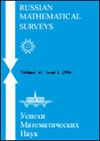伊戈尔·莫伊谢维奇·克里切弗
IF 2.1
4区 数学
Q1 MATHEMATICS
引用次数: 0
摘要
Igor ' Moiseevich krichhever于1950年10月8日出生在古比雪夫(现在的萨马拉)的一个军人家庭。他的父母Moisei Solomonovich Krichever和Mariya Leizerovna Arlievskaya都是航空工程师。他们来自白俄罗斯的莫吉廖夫和波洛茨克,都是很有才华的人,他们克服了生活中的许多困难。伊戈尔·克里切弗的数学能力和适应力一定是遗传自他们。1963年至1965年在塔甘罗格教他的数学老师塔西娅·米特罗法诺夫娜·米什琴科在克里切弗的一生中发挥了重要作用。她的许多学生就读于著名的莫斯科物理和数学学校。18(刚刚由A. N. Kolmogorov建立),以“Kolmogorov寄宿学校”的名字而闻名。Igor ' Krichever也是如此:他在1965年8年级后被邀请加入,以表彰他成功参加了全联盟数学奥林匹克竞赛。1967年,当他还是一名10年级学生时,本文章由计算机程序翻译,如有差异,请以英文原文为准。
Igor’ Moiseevich Krichever
Igor’ Moiseevich Krichever was born on 8 October 1950, in a military family in Kuibyshev (now Samara). His parents, Moisei Solomonovich Krichever and Mariya Leizerovna Arlievskaya, were aviation engineers. They came from Mogilev and Polotsk in Belorussia (now Belarus), and both were talented persons, who had overcome a lot of trouble in their lives. Igor’ Krichever must have inherited his mathematical abilities and his resilience from them. His school mathematics teacher Taisiya Mitrofanovna Mishchenko, who taught him in Taganrog in 1963–1965, played an important role in Krichever’s life. Many of her students enrolled in the famous Moscow Physical and Mathematical School no. 18 (only just then founded by A. N. Kolmogorov), better known under the name of the ‘Kolmogorov Boarding School’. And so did Igor’ Krichever: he was invited to enroll it in 1965, after the 8th grade, in recognition of his successful participation in the All-Union Mathematical Olympiad. In 1967, when he was a 10th grade student,
求助全文
通过发布文献求助,成功后即可免费获取论文全文。
去求助
来源期刊
CiteScore
1.70
自引率
0.00%
发文量
12
审稿时长
>12 weeks
期刊介绍:
Russian Mathematical Surveys is a high-prestige journal covering a wide area of mathematics. The Russian original is rigorously refereed in Russia and the translations are carefully scrutinised and edited by the London Mathematical Society. The survey articles on current trends in mathematics are generally written by leading experts in the field at the request of the Editorial Board.

 求助内容:
求助内容: 应助结果提醒方式:
应助结果提醒方式:


